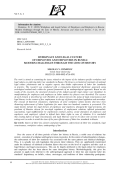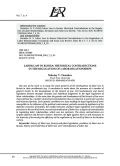The work is aimed at examining the issues related to the impact of the industry-specific workplace and legal culture on enforcing labor law standards in Russia. The focus is on historical continuity of national legal culture phenomena and its negative aspects that hinder enforcement of labor law standards in practice. The research was conducted with a comparative-historical diachronic approach using sociological method tools within the general framework of an anthropological approach. Based on the results of the research, the structural elements of the industry-specific legal culture were identified, its manifestations for employees and employers as labor market key players were described. The essence of each element is described as well. Parallels are drawn between the status of legal consciousness and legal literacy in the context of free employment in the age of factory-and-plant legislation and nowadays. The concept of historical consistency, implicitness of some workplace culture factors that have been distorting enforcement of labor legislation for more than two hundred centuries is presented. The major factors include low legal literacy of employees and employers, disregard for legal provisions, the penchant of Russian citizens for non-legal regulators of employment relations, inflated paternalistic expectations, legal indifferentism by employment contract parties, social alienation of employees and employers, and employee’s refusal to defend their labor rights in case of violation. It is concluded that existing defects of legal consciousness and legal illiteracy need to be taken into account in norm- setting work in order to avoid the issue of the poor effectiveness of labor law standards in Russia.
The aim of the work is to study the main patterns of the development of labor law in Russia in their problematic key. A conclusion is made about the presence of a number of general trends in the development of the branch of law. Pre-revolutionary and Soviet legislators formed strategic concepts and individual judgments in the legal regulation of labor relationships. At the same time the genesis and development of this branch of law were characterized by a number of destructive foundations that are inherent to particular systems and historical periods. Such ‘genetic’ problems are: laws making the legal regulation of work susceptible to the influence of the political environment; periodic evasion by legislators of the objective economic principles; the conflict between standard legal regulation and unlawful practices in the world of work; excessive formalization of labor law; a degree of centralization in regulating labor relationships, which was not optimum. The above contradictions are largely objective and forced in nature. However, the fight against them is still necessary in the interests of increasing the efficiency of the regulation of the world of labor in the Russian society.

